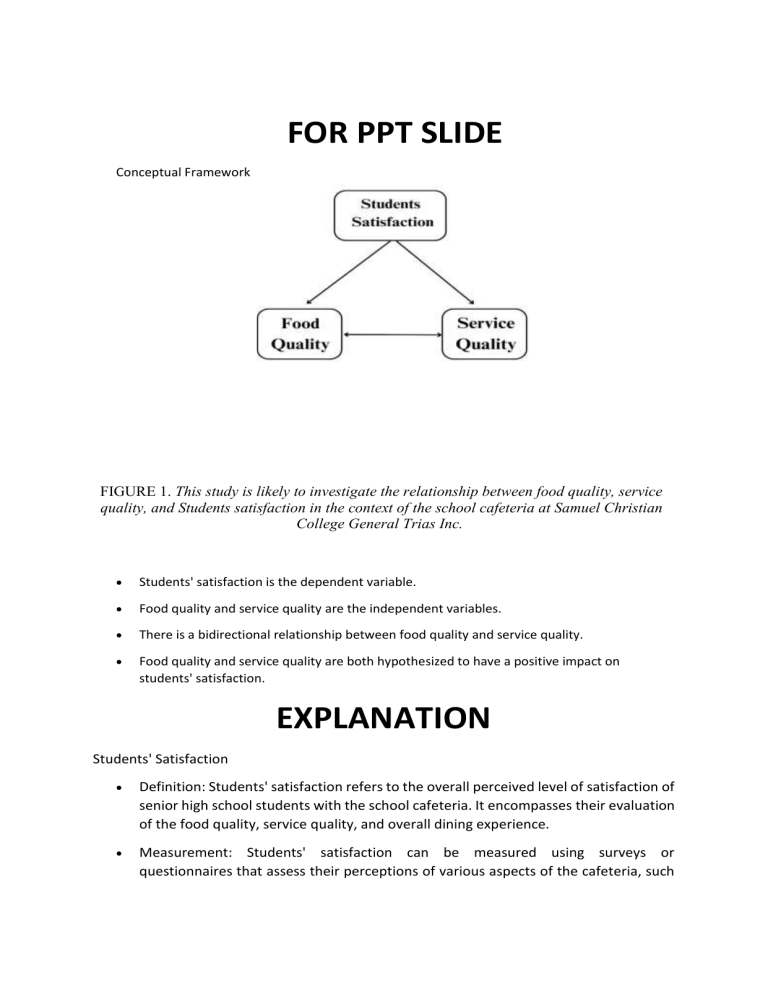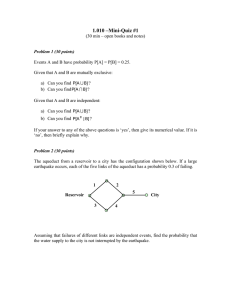
FOR PPT SLIDE Conceptual Framework FIGURE 1. This study is likely to investigate the relationship between food quality, service quality, and Students satisfaction in the context of the school cafeteria at Samuel Christian College General Trias Inc. Students' satisfaction is the dependent variable. Food quality and service quality are the independent variables. There is a bidirectional relationship between food quality and service quality. Food quality and service quality are both hypothesized to have a positive impact on students' satisfaction. EXPLANATION Students' Satisfaction Definition: Students' satisfaction refers to the overall perceived level of satisfaction of senior high school students with the school cafeteria. It encompasses their evaluation of the food quality, service quality, and overall dining experience. Measurement: Students' satisfaction can be measured using surveys or questionnaires that assess their perceptions of various aspects of the cafeteria, such as the taste, freshness, and variety of food; the speed, friendliness, and helpfulness of staff; and the overall ambiance and cleanliness of the cafeteria. Implications for the study: Understanding students' satisfaction levels is crucial for identifying areas for improvement in the cafeteria. By assessing what students like and dislike about the cafeteria, the school can make informed decisions about how to enhance their overall dining experience. Food Quality Definition: Food quality refers to the overall perceived quality of the food served in the school cafeteria. It encompasses factors such as taste, freshness, appearance, variety, nutritional value, and portion sizes. Measurement: Food quality can be assessed through sensory evaluations, which involve trained individuals or panels evaluating the taste, texture, aroma, and appearance of the food. Alternatively, student surveys can be used to gather their perceptions of food quality. Implications for the study: Evaluating food quality provides insights into the aspects of the cafeteria's food that students find appealing or dissatisfying. This information can guide improvements in menu planning, ingredient sourcing, and cooking techniques to enhance the overall quality of the food offerings. Service Quality Definition: Service quality refers to the overall perceived quality of the service provided in the school cafeteria. It encompasses factors such as speed, accuracy, friendliness, helpfulness, and empathy of the cafeteria staff. Measurement: Service quality can be measured through customer service surveys or direct observation of staff interactions with students. These assessments can provide valuable feedback on areas where service quality can be improved. Implications for the study: Evaluating service quality allows for identifying areas where staff training and customer service protocols can be enhanced. By improving the quality of service, the cafeteria can create a more welcoming and pleasant dining experience for students. IMPLICATION INTO Relationship between Food Quality and Service Quality Definition: The bidirectional relationship between food quality and service quality suggests that these two factors influence each other. High food quality can increase students' tolerance for lower levels of service quality, and vice versa. Measurement: This relationship can be explored through statistical analysis of student satisfaction ratings and their perceptions of food and service quality. Identifying the interplay between these factors can provide insights into how to optimize both aspects of the cafeteria experience. Implications for the study: Understanding the bidirectional relationship between food quality and service quality emphasizes the importance of addressing both factors simultaneously to maximize students' satisfaction. By improving both the quality of the food and the quality of service, the cafeteria can create a more comprehensive and satisfying dining experience for senior high school students. ETHICAL CONSIDERATION Privacy: Researchers must respect the privacy of students, staff, and cafeteria patrons. This includes protecting personally identifiable information (PII) and not collecting data that is not relevant to the study. Honesty: Researchers should be honest with participants about the purpose of the study and how their data will be used. They should also avoid making promises that they cannot keep. Respect: Researchers should treat participants with respect and dignity. This includes being sensitive to their needs and concerns, and avoiding any actions that could cause them harm or distress. Security: Researchers must take steps to protect the security of participants' data. This includes using secure data storage and transmission methods, and limiting access to data to authorized personnel only. Objectivity: Researchers should strive to be objective in their data collection and analysis. This means avoiding bias and making decisions based on evidence rather than personal opinions or beliefs. Legality: Researchers must comply with all applicable laws and regulations, including the Data Privacy Act of 2012. This includes obtaining informed consent from participants and protecting their privacy rights.

